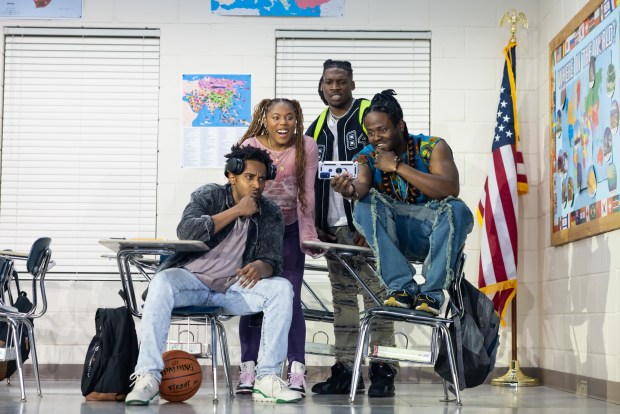A Black man finds himself in confrontation with the police as anxious neighbors watch from their apartment, horrified at the escalating confrontation, grabbing their phones to document what is happening. A crescendo begins to rise as if this all-too-familiar event will end with violence as so many others have. But then there’s a flash and bang and the man disappears into thin air.
No one knows where he went. He didn’t run off. He just seems to have vanished as if by magic, leaving the police officers scratching their heads, perplexed by what just happened.
When you watch that intriguing opening scene of Zora Howard’s “Bust,” an accomplished new play produced at the Goodman Theatre in concert with both the Alliance Theatre in Atlanta and the commercial producer Sonia Friedman, what shoots into your head is how skillfully this gifted writer has come up with a metaphor for a solution to this most vexing and dangerous of ubiquitous American confrontations; if one of what typically are two angry parties could immediately be transported out of the situation, as if by a “Star Trek”-like teleporter, lives would be saved.
Mysteries deepen as “Bust” progresses, and we learn that these magical disappearances are not limited to one occurrence. Before the end of this two-hour play, Howard has revealed the destination, too, evoking the famous “Somewhere” number in “West Side Story,” broadening her themes to explore not just a notable method of violence-interruption but the danger of pent-up anger and bottled-up feelings, all in service of the truth that shootings traumatize not just those directly involved, but the witnesses and the entire community. And that confrontations with unintended consequences create an endless cycle of repetition and pain.
That description makes “Bust” sound like a heavy night of theater, which is not entirely incorrect. But Howard strives to leaven the experience with comedy, whether that flows from the exuberant spirits of Reggie (Ray Anthony Thomas) and Retta (the especially excellent Caroline Stefanie Clay) watching the confrontation, or the slew of mostly young high schoolers (variously played by Bernard Gilbert, Victoria Omoregie, Ivan Cecil Walks and Renika Williams-Blutcher) wondering about this disappearance thing, only to find that Reggie and Retta’s grandson, Trent (Cecil Blutcher), might also be a candidate for finding his way to the other side.
“Bust” is one of several dramatic works (such as “Pass Over” and the opera “Blue”) written about police shootings that were first developed during the pandemic, post-George Floyd era, a time of trauma and unrest when few Black writers in the nonprofit American theater felt inclined to be fair to police. And, indeed, the white officer here (played by Mark Bedard) is a stereotype of a racist Alabama cop, sans a reasonable bone in his body. His immigrant partner, Ramirez (Jorge Luna) is also somewhat stereotypically drawn, replete with concern for his large family, unease with his job and other standard-issue tropes that I’m not convinced most Latino cops would appreciate. The play’s Black characters are drawn with diversity, vivacity and, above all, complexity.
I’d argue “Bust” would be a yet better play if it threw out those stereotypes and created complex figures from those cops. For example, the play seems to either not know or not care how often police officers act out of fear, justified or not, for their personal safety, especially when they don’t know someone’s location. As any clear-eyed specialist in these matters will tell you, that often explains why things go so terribly wrong. “Bust” just treats these cops as either expediently trying to keep their job (the Latino officer) or being aggressively racist (the white officer). What a play this would be if had the courage to eschew such melodrama. It might really have the capacity to make an even bigger impact.
Director Lileana Blain-Cruz’s production is an exuberant and exciting affair, although the set sometimes gets in the way of the power of the work, sending the actors upstage or trapping them in a raised box in the work’s most primal moments. The performances are very much present and alive and that serves to reflect the play’s notion that vibrant Black life gets assaulted from without.
But when the scenes set in a familiar landscape feel so heightened as to not be truthful, which happens occasionally, that diminishes the power of the semi-mythical landscape the play posits as balm and a salve for the Black soul. It other words, too much of a departure from reality diminishes the crucial contrast with the other side, the somewhere, wherein lies Howard’s most potent political observation and artistic longing lies.
That could and should be fixed. Act 2 of “Bust” is mostly excellent, especially the scenes where the actor Keith Randolph Smith, who I’ve admired for decades, lays out the price always paid by Black Americans, whether engaged in an assaultive world or choosing to inhabit somewhere different, somewhere of their own design.
Therein, Howard really hits a chord: She’s writing about anger and trauma, for sure, but also about the perennial dilemma as to whether to engage and struggle, politically and within a family, or disengage for greener personal pastures. Who has not wondered about that?
Chris Jones is a Tribune critic.
cjones5@chicagotribune.com
Review: “Bust” (3 stars)
When: Through May 18
Where: Goodman Theatre, 170 N. Dearborn St.
Running time: 2 hours
Tickets: $25-$85 at 312-443-3800 and goodmantheatre.org
Sign up for the Theater Loop newsletter: Our weekly newsletter has the latest news and reviews from America’s hottest theater city. Theater critic Chris Jones will share a behind-the-curtain look at what you need to know.




